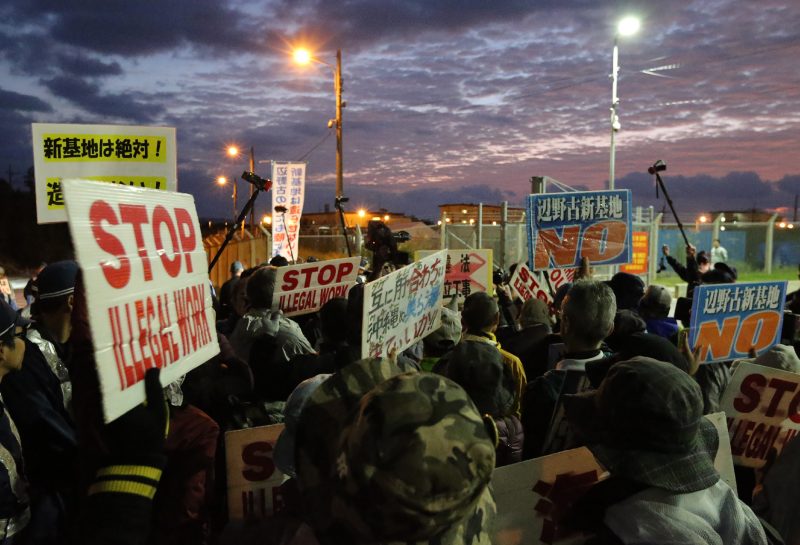Japan’s Okinawa votes on controversial US base move
The Futenma US military base has stoked tension with local residents over problems ranging from noise and military accidents to crime involving base residents (JIJI PRESS)
Okinawa (Japan) (AFP) – Residents of Japan’s Okinawa were casting ballots Sunday in a closely watched referendum on the controversial relocation of a US military base to a remote part of the island.
The vote is seen as highly symbolic but is also non-binding, raising questions about what effect it will have, even if opponents of the move, including Okinawa Governor Denny Tamaki, prevail.
The ballot asks residents whether they support a plan to reclaim land at a remote coastal site for the relocation of the Futenma base from its current location in a heavily-populated part of Okinawa.
It was initially planned as a yes-no vote on the move, but a “neither” option was added after several cities with close ties to the central government threatened to boycott the vote.
Polls opened early on Sunday morning, with about 1.15 million Okinawans eligible to vote. The Jiji Press agency reported around 20.5 percent of eligible voters had already cast ballots in early voting by Saturday.
“They are using a lot of tax money and manpower for this referendum, even though the result will not have any legal power. So we thought that we should take this opportunity and think very carefully about this issue,” said Yuki Miyagaki, after casting her ballot at a local school.
“We usually shout no to the new base construction. This is a good opportunity to tell the government directly with concrete numbers: ‘No’. This is an important vote,” 32-year-old Narumi Haine told AFP.
Although the referendum is not legally binding, “it is significant that people in Okinawa can express their will through the vote,” said Jun Shimabukuro, a professor at Ryukyu University in Okinawa.
“It can be a test to gauge if democracy is working in Japan,” Shimabukuro told AFP before voting opened.
The relocation of Futenma to Nago, 50 kilometres (30 miles) away, was first agreed in 1996 as the US sought to calm local anger after US servicemen gang raped a local schoolgirl.
But the plan has long been stalled in part over local opposition.
– ‘Making a fool of Okinawa’ –
The Futenma base has stoked tension with local residents over problems ranging from noise and military accidents to crime involving base residents.
Prime Minister Shinzo Abe’s government says the relocation will address those concerns, but many in Okinawa want the base relocated elsewhere in Japan.
They argue that the region bears a disproportionate burden when it comes to hosting US military troops in the country.
Okinawa accounts for less than one percent of Japan’s total land area, but hosts more than half of the approximately 47,000 American military personnel stationed in Japan.
Anti-base rallies have been staged daily in Okinawa since campaigning for the referendum began in mid-February.
But the vote has not stopped reclamation work at Nago, with construction workers continuing to shovel dirt into the ocean offshore with bulldozers.
“We hope the referendum will boost the momentum of our fight,” demonstrator Masaru Shiroma told AFP on Friday, as more than 100 fellow activists tried to block trucks entering the construction site on Friday.
“The government is making a fool out of Okinawa.”
– ‘Precious votes’ –
The ballot closes at 8:00 pm with exit polls expected soon after and official results from as early as midnight.
Okinawa’s governor is required to “respect” the vote’s outcome if at least a quarter of eligible voters — around 290,000 votes — vote for any one option.
Tamaki has urged residents to turn out and cast their “precious votes” in the poll.
A opinion poll by the Asahi Shimbun newspaper this week found 59 percent of people in Okinawa oppose the reclamation while 16 percent support it.
The survey also found 80 percent of respondents want Abe’s government to respect the results.
But there has been little sign Abe’s government will shift course if the vote goes against the move, with Chief Cabinet Secretary Yoshihide Suga saying there were no plans to halt the relocation regardless of the outcome.
Japan’s military alliance with the United States is seen as a key partnership, and Okinawa’s location near Taiwan has long been viewed as having huge strategic importance for US forward positioning in Asia.
Disclaimer: This story is published from a syndicated feed. Siliconeer does not assume any liability for the above story. Validity of the above story is for 7 Days from original date of publishing. Content copyright AFP.


